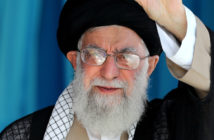As evidence increasingly suggests the Russian plane crash in Egypt on 31 October was the work of terrorists, there are growing fears that the Islamic State is beginning to successfully expand, which could lead to the extremist group cultivating a presence on a global scale.
Even if investigations into the cause of the crash which occurred on the Sinai Peninsula are still ongoing, with both Russia’s and Egypt’s foreign ministers Sergey Lavrov and Sameh Shoukry saying that it was still too early to draw conclusions over exactly what happened, reactions have been swift.
An emergency COBRA meeting was held in London that prompted British foreign secretary Philip Hammond to advise that all flights from Sharm El Sheikh to the UK were to be cancelled, leaving around 20,000 Britons stranded. He added they would remain so until more information was uncovered and a safe journey home could be secured for British holidaymakers in the Red Sea resort. By Sunday evening, about 5000 had returned home while the remaining 15,000 were stuck in filthy living conditions.
However, focusing on the plight of holidaymakers obscures the bigger picture, namely the seemingly unstoppable rise of IS. The terrorist group’s capacity to wreck havoc across the Middle East and beyond has only gone from strength to strength, laughing in the collective face of sombre military planners from Washington to Moscow.
Islamic State and the pharaohs
Unfortunately, Egypt as the next potential front for IS was long foretold; unhappiness at the military coup staged by Abdel Fatah al-Sisi in 2014 that unseated democratically elected president Mohammed Morsi made for a ripe breeding ground of discontent and left many people disenfranchised. Since the Sinai peninsula had a long history of banditry, going back to the Egypt-Israel peace treaty of 1979 that left it with a diminished security presence, militant groups allied to IS made it their home and quickly grew in number. Since the launch of the terrorist insurgency back in 2011, more than 2000 militants have so far been killed in clashes with Egypt’s security forces.
However, there is hope that this could change. While still unhappy with Egypt’s human rights record, relations between Egypt and the US have begun to thaw. President Obama has recently offered Cairo some military and naval support to the tune of $1.3 billion a year. France pitched in as well, selling the 2 Mistral frigates earmarked for Russia to Egypt in September’s shock transaction. This week’s visit by al-Sisi to London also implies that Egypt understands the need for more international co-operation in any capacity. And, with closer international ties Egypt could stage a fight-back against IS.
Expectations – however slim – of a more globally integrated Egypt aside, what is becoming clear is that the reach of IS is no longer limited to Syria and Iraq, and is only set to grow. That’s certainly a view British holidaymakers can attest to following the deadly June incident on a Tunisian beach which left 38 people shot at the hands of an IS gunman. But that’s only half the picture.
Islamic State in the rainforest
If there’s one common thread to IS’s activities outside the Middle East, it is their uncanny proliferation in some of the best-known holiday hotspots. Indeed, it’s not just the sandy beaches of Sharm el Sheikh that have fallen under their spell, but also some of Southeast Asia’s best known tropical rainforests. According to some reports, over 500 Indonesians have already travelled to the Middle East to join the ‘holy war’, families among them, galvanized by the aggressive propaganda launched by IS. And with no laws in Indonesia to prevent travel abroad to partake in military training, their return home could lead to widespread extremist behaviour, including acts of violence, in the name of IS.
Jihadi tourism is also behind the bid launched by 22 local terrorist groups that have pledged allegiance to IS, including al-Qaeda affiliate Jemaah Ansharut Tauhid (JAT), the outfit responsible for the deadly 2002 Bali bombings that left 202 people dead in a string of bomb attacks on some of the island’s most popular clubs.
Willing to stop the influx and aware of the magnitude of the crisis, the Malaysian government has stepped in and joined the US-led alliance against IS. In September, it announced the creation of a Regional Digital Counter-Messaging Communication Center (RDC3). It will be set-up within the next 12 month with the help of the US and its main function will be to target IS’ social media presence, Malaysia’s deputy prime minister Ahmad Zahid Hamidi said in October. RDC3 will be available to all ASEAN countries, with Malaysia the choice for the location of the centre following its decision to introduce a host of new legislation to tackle IS and extremism in the wake of increased arrests of suspected IS members. They include laws against travelling overseas for military training and a concerted effort to rehabilitate and de-radicalize Malaysian militants.
Where Malaysian authorities are clearly stepping up their fight against IS and extremism, in nearby Indonesia the government is not as forthright. Indonesia, where a reported 72% of Muslims are in favour of living under Shariah law – is showing signs of increased IS activity. In light of that figure, the IS ideal of living under a pure form of Shariah Law is surely at the forefront of the movement.
IS has not grown to a global force in a vacuum – it has relied on government inaction, tapping into poverty, repression and local frustrations to build a large body of followers. Policymakers need to act now in order to safeguard countries that already fit this criteria, limit the damage and halt the global progress of ISIS.




